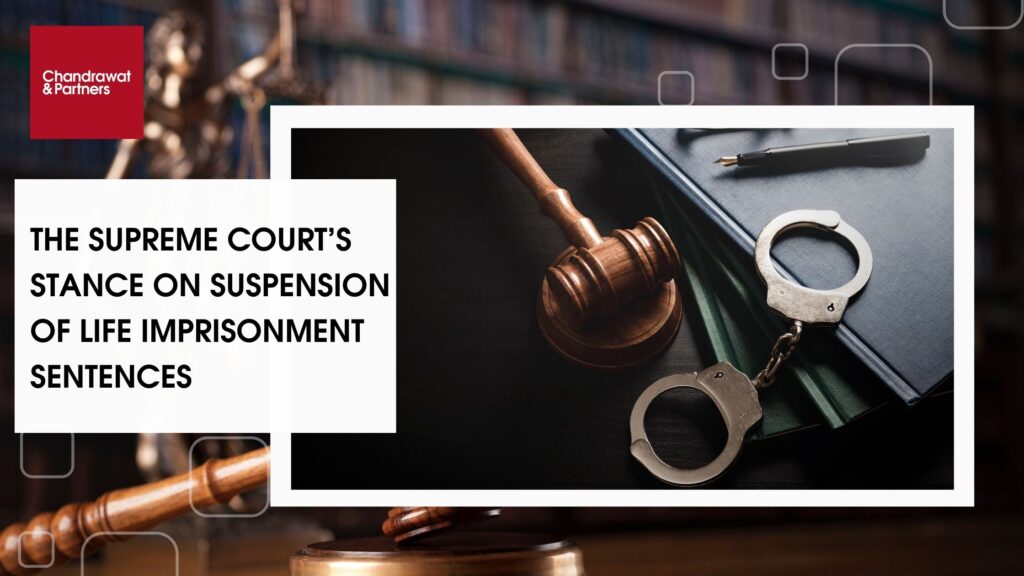
THE SUPREME COURT’S STANCE ON SUSPENSION OF LIFE IMPRISONMENT SENTENCES
In a significant decision, Supreme Court of India ruled that the suspension of a life sentence can only be considered only if there is clear evidence that the conviction is unsustainable and the conviction has an opportunity of prevailing on appeal. This decision reflects the court’s commitment to ensuring that life sentence is not taken lightly and that the judicial process adheres to strict standards when considering the suspension of such term.
CASE ANALYSIS
The ruling was part of the case “Bhupatji Sartajji Jabraji Thakor vs. The State of Gujarat,” during which the Supreme Court declined to put off the appellant’s life sentence. The contentions of the counsel were that there were mitigating circumstances, such as the necessity to provide for his widowed daughter-in-law and her three minor children. Despite these considerations, the court found no compelling basis to believe that the conviction was unsustainable, resulting to a refusal to overturn the High Court’s ruling. This case establishes a precedent emphasizing the importance of a solid prima facie argument when suspending a life sentence. The Supreme Court’s policy ensures that life sentences are not reversed arbitrarily, and that the process of appeal has to be respected and followed diligently.
THE COURT’S STANCE ON LIFE SENTENCES
The Supreme Court observed that a life convict could only be granted the benefit of suspension of sentence is its prima facie appears that the conviction is unsustainable, and the convict has a high chance of succeeding in an appeal against the conviction. The court emphasized that the benefit of suspension of sentence cannot be granted to the convict if there is nothing palpable to conclude that the conviction was unsustainable in law. The decision was issued by a bench, which highlighted the significance of a rigorous criteria for determining whether to suspend life imprisonment terms. They stated that, while judges may be more lenient with fixed-term penalties, the same forbearance cannot be applied to life sentences. The court’s comparison points out the seriousness of life imprisonment as opposed to fixed-term consequences. The appellate court may frequently defer the execution of a fixed-term sentence unless there are exceptional circumstances. However, in circumstances of life imprisonment, the court must find anything “palpable or apparent on the face of the record” that suggests the conviction is not legally valid.
IMPLICATIONS FOR FUTURE CASES
The Supreme Court’s decision has significant implications on how life sentences are handled in India’s judicial system. It clarifies that a life sentence can only be suspended if there is clear evidence that the conviction was not accurate. This provides an extra layer of safeguards to the legal system, ensuring that life sentences, the most severe penalties allowed short of the death penalty, are imposed and reviewed with extreme caution. This decision also gives guidelines for subordinate courts in hearing pleas for the suspension of life sentences. It demands thorough evaluation process, ensuring that only individuals with a strong probability of achieving an appeal can have their sentences suspended. This measure prevents the misuse of the appeals process and ensures that justice is served fairly and equitably.
BALANCING COMPASSION AND LEGAL RIGOR
While the ruling by the Supreme Court prioritizes legal rigor, it also acknowledges the need for compassion in certain situations. In the aforementioned instance, the court issued a notice to the State to consider the appellant’s bail application based on the mitigating circumstances. This demonstrates that the court is not completely inflexible and can consider humanitarian concerns after a careful legal analysis.
ANALYSIS
The Supreme Court’s decision in Bhupatji Sartajji Jabraji Thakor v. State of Gujarat establishes a precedent for the suspension of life imprisonment sentences, underlining the importance of a rigorous legal standard. This decision is a significant milestone in the Indian legal system, ensuring that the concepts of justice and fairness are respected while exercising caution while giving bail to life prisoners. The decision has far-reaching repercussions on how appellate courts consider pleas for sentence suspension in life imprisonment cases. The Supreme Court tries to combine convicts’ rights with the ideals of justice by needing concrete evidence that a conviction is untenable, ensuring that life imprisonment terms are not suspended easily.
For more information or queries, please email us at
enquiries@chandrawatpartners.com



